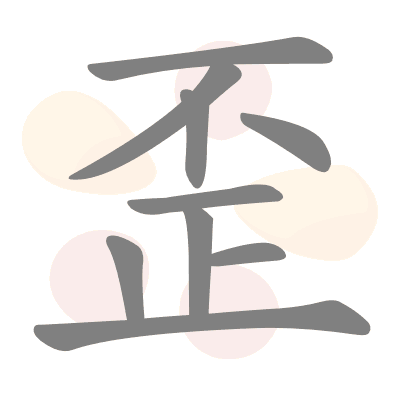歪
歪
adj./v. askew, slanting; improper, underhand; (dialect) to recline
| 80% | 120% |
Register to get less ads.
Registration is free and once you are registered you use this word in your private vocabulary lists.
Then you can train your own vocabulary either here or using one of our applications for PC, iOS or Android.
Registration is free and once you are registered you use this word in your private vocabulary lists.
Then you can train your own vocabulary either here or using one of our applications for PC, iOS or Android.
 |
Simplified stroke orders are based on the 'Standard of National Commonly-used Mandarin Chinese Characters (现代汉语通用字笔顺规范)', issued by the China National Language and Character Working Committee (国家语言文字工作委员会) on April 7th 1997. Traditional stroke orders are based on information issued by the Taiwan Ministry of Education.
正 / 正
[adj] (of color or taste) pure; straight; upright; appropriate, legal; principal, chief; (of design) regular; (math and physics) positive
[adj] (of color or taste) pure; straight; upright; appropriate, legal; principal, chief; (of design) regular; (math and physics) positive
站 站 phr. From my point of view, you will find the tower is crooked. |
那 那 phr. That is a slanting tree. |
邪 邪 idiom. devious means, crooked ways; dishonest methods |
歪 歪 n. unhealthy trend |
把 把 phr. so angry that the nose goes awry; very angry with an obvious facial expression |
上 上 idiom. If the upper beam is not straight, the lower ones will go aslant. -- When the superiors (or parents) do not set a good example, the subordinates (or children) are not expected behave well. |
歪 歪 idiom. crooked melon and cracked date, (fig. of person) have an ugly appearance |
歪 歪 idiom. devious means, crooked ways; dishonest methods (same as 邪门歪道) |
歪 歪 n. false reasoning, lame argument, fallacy |
歪 歪 n. crooked path, dishonest practices, improper means |
歪 歪 adj. askew, crooked, shapeless and twisted |







